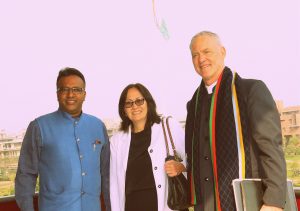To provide a platform for exchanging the latest insights in both theory and practice, and to explore the interactive relations between global development scenarios and their stakeholders, The Centre for Study of Political Violence (CSPV) and Centre on International Economic Studies (CIES) of the Jindal School of International Affairs (JSIA) hosted a conference on “Conflict and Economic Development 2016” between 26-27 September 2016 at the O.P. Jindal Global University campus in Sonipat.
The two day international forum aimed to initiate transdisciplinary and transnational dialogues on complex issues of assessing dynamics of conflicts, linkages between military expenditure and economic development, political economy of the media, gender based violence. Besides the conference critically analyzed the role of institutions, states and armed groups in war-zones in Africa, South Asia and the Middle East.
Delivering a special address at the forum, Professor, C Raj Kumar, Founding Vice-Chancellor, O. P. Jindal Global University highlighted that the timing of this forum is crucial given that India and its neighbours are still grappling with protracted crisis and conflicts and that as a research oriented institution, JGU continuously seeks to initiate and engage key individuals and institutions in transdisciplinary and transnational dialogues on diverse issues.
Prof. Kumar further called for a nuanced understanding of the complex issues surrounding the theme of the conference and expressed hope that the discourse would be meaningful and have a long-lasting impact.
Delivering the welcome address, Professor (Dr.) Sreeram Sundar Chaulia, Dean of Jindal School of International Affairs focused on multi- dimension aspect of economic development and conflict. He said, that in some cases countries with higher economic development also face conflict such as Kashmir in 1980s. Thus, unequal distribution of income, fall in standard of living and ethnic diversity may also lead to conflict, he added.
The inaugural session marked the launch of a co-edited book, Violence, Statistics and the Politics of Accounting for the Dead (Springer 2016). The book was co-edited by Dr. Marc Antoine Perouse de Montclos (University of Paris 8), Elizabeth Minor, Advisor to Every Casualty and Researcher at Article 36 and Dr. Samrat Sinha of JSIA.
In his keynote address Dr. Marc-Antoine Pérouse de Montclos, Professor, French Institute of Geopolitics, University Paris 8 & Peace Research Institute Oslo, Global Fellow, talked about misleading statistics, figures and reports. He mentioned that statistics, surveys, censuses and reports in areas of conflict contain incomplete information due to the insecure environment. It is very challenging to have an accurate picture of a war zone and design appropriate responses for this reason.
In addition, Ms. Elizabeth Minor, Researcher, Article 36, London, United Kingdom, focused on documentation and systematic recording of deaths and injuries in conflict situations. She stated that presenting certain numbers contribute to achieve objectives such as, changes in military policies, conflict resolution policies and changes in the activities of humanitarian agencies. She also emphasized that recording of casualties provides information on human losses, but the methodology affects the process and outcome.
Professor Nandini Sundar, Professor of Sociology, Delhi School of Economics, University of Delhi talked on ‘Rethinking Conflict in the Age of Development’ and the dominant explanation of civil war that focuses on poverty and ethnic diversity, her presentation highlighted problems of people in a crisis setting such as Chattisgarh under Maoists where even access to education in the villages is limited.
In different parallel sessions during the two days of the conference, participants engaged in fruitful discussion on themes such as marginalization of women and underdeveloped countries in international forums; psychosocial impact of conflict in fragile states and the role of international organizations’ in such conflict affected areas.
The international forum brought together leading academics, stakeholders from local and international organizations and think tanks both from India and abroad to discuss issues of conflict and economic development in fragile states in a much deeper manner from the perspective of practitioners as well as academia.

